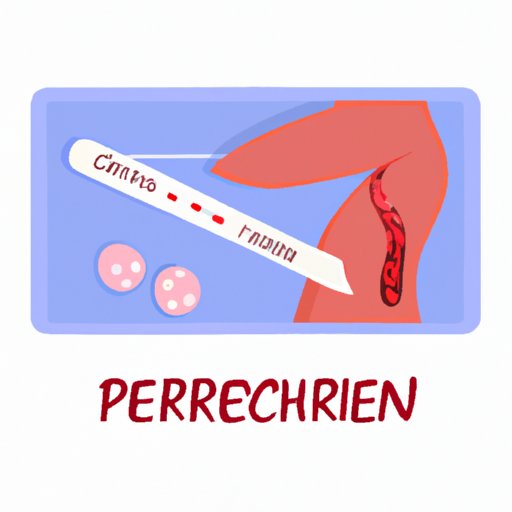
Introduction
There is a common misconception that menstruation is necessary for pregnancy. However, this is not entirely true. Women who do not have a period may still be able to conceive. This article aims to help those who are experiencing issues with getting pregnant without having a period.
Breaking Down the Myth: Can You Get Pregnant Without Having a Period?
Ovulation is the period when the ovary releases an egg, which then travels down the fallopian tube and may get fertilized by sperm. Pregnancy occurs when a fertilized egg implants in the uterus. Menstruation happens when there is no fertilization and the uterus sheds its lining.
The menstrual cycle plays a significant role in ovulation. Typically, ovulation occurs around 14 days before the start of the next menstrual cycle. However, ovulation can occur at any time in the menstrual cycle. This means that women who do not have a period can still ovulate and conceive.
Anovulation is a condition where a woman does not ovulate or release an egg. This can cause problems with fertility, but it does not necessarily mean that pregnancy is impossible. Women who have irregular periods or no periods at all may still ovulate and conceive.
Medical Causes of Infrequent Periods and Their Impact on Fertility
Various medical conditions can cause irregular periods, such as hypothyroidism or polycystic ovary syndrome (PCOS). These conditions can cause hormonal imbalances, which can affect fertility.
If you suspect that you have a medical condition that is affecting your menstrual cycle, it is essential to see a doctor. They can provide you with a diagnosis and discuss treatment options that may regulate your periods and improve your fertility.
Alternative Ways to Track Ovulation When You Don’t Have a Period
For women who do not have a period, there are still alternative ways to track ovulation. One of the most effective methods is to monitor basal body temperature. A woman’s basal body temperature rises slightly after ovulation, indicating that it has already taken place.
Another method is to track cervical mucus. Around ovulation, cervical mucus becomes more abundant and slippery to help sperm swim through the cervix and into the uterus.
The Connection Between Polycystic Ovary Syndrome (PCOS) and Pregnancy
PCOS is a hormonal disorder that affects up to 10% of women of reproductive age. Women with PCOS may have irregular periods or no periods at all. This can make it difficult to predict ovulation and conceive.
However, women with PCOS can still get pregnant with the help of treatments such as ovulation induction with medications or in-vitro fertilization (IVF). These treatments can help regulate ovulation and increase the chances of pregnancy.
The Emotional Toll of Infertility When You Don’t Have a Period
Infertility can cause significant emotional distress. For women who do not have a period, the emotional burden can be even more challenging. It is essential to seek support from friends, family, or a professional who can help you work through the complex emotions associated with infertility.
Conclusion
While menstruation plays a significant role in pregnancy, it is not entirely necessary for conception. Women who do not have a period may still ovulate and conceive. It is important to seek medical advice if you have irregular periods or suspect an underlying medical condition. There are alternative ways to track ovulation, and treatments such as ovulation induction or IVF are available to help increase the chances of pregnancy.





